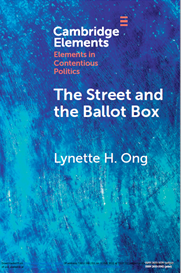Error message

The East-West Center in Washington invites you to an
Indo-Pacific Democratic Values and Human Rights Series Webinar and Book Launch:
The Street and the Ballot Box: The Bersih Movement, 2018 Election,
and the Implications for Malaysian Politics
A Conversation With:
Dr. Lynette H. Ong
Associate Professor of Political Science,
Munk School of Global Affairs and Public Policy,
University of Toronto
Dr. Dan Slater
Ronald and Eileen Weiser Professor of Emerging Democracies and Weiser Center
for Emerging Democracies Director & Professor of Political Science,
University of Michigan
Dr. Satu P. Limaye (Moderator)
Vice President, East-West Center &
Director, East-West Center in Washington
East-West Center in Washington · The Street and the Ballot Box: The Bersih Movement, 2018 Election, and Malaysian Politics

Drawing on Malaysia’s Bersih movement and the 2018 election, Dr. Lynette Ong’s latest book, The Street and the Ballot Box: Interactions between Social Movements and Electoral Politics in Authoritarian Contexts, illustrates how a broad-based social movement that champions a widely shared grievance can mobilize across social cleavages and unite elites and society. Such a movement contributes to cohesion of opposition coalition, which is crucial for regime change. She drew on the implications of Bersih for the state of Malaysian politics since 2018.
SPEAKER BIOGRAPHIES

Lynette H. Ong is an associate professor of political science at the Munk School of Global Affairs and Public Policy, the University of Toronto. She is the author of two recent monographs: Outsourcing Repression: Everyday State Power in Contemporary China (Oxford University Press, 2022), and The Street and the Ballot Box: Interactions between Social Movements and Electoral Politics in Authoritarian Contexts (Cambridge University Press, Elements Series in Contentious Politics, 2022). Her research addresses issues at the intersection of authoritarianism, contentious politics, and development, with an emphasis on China and Asia in general.

Dan Slater (Ph.D. Emory, 2005) specializes in the politics and history of enduring dictatorships and emerging democracies, with a regional focus on Southeast Asia. He comes to Michigan after twelve years on the faculty at the University of Chicago, where he served as Director of the Center for International Social Science Research (CISSR), Associate Professor in the Department of Political Science, and associate member in the Department of Sociology. He is the co-author of a forthcoming book, From Development to Democracy: The Transformations of Modern Asia (September 2022, Princeton University Press), with University of Toronto vice president Joseph Wong. His book examining how divergent historical patterns of contentious politics have shaped variation in state power and authoritarian durability in seven Southeast Asian countries, entitled Ordering Power: Contentious Politics and Authoritarian Leviathans in Southeast Asia, was published in the Cambridge Studies in Comparative Politics series in 2010. He is also a co-editor of Southeast Asia in Political Science: Theory, Region, and Qualitative Analysis (Stanford University Press, 2008), which assesses the contributions of Southeast Asian political studies to theoretical knowledge in comparative politics. His published articles can be found in disciplinary journals such as the American Journal of Political Science, American Journal of Sociology, Comparative Politics, Comparative Political Studies, International Organization, Perspectives on Politics, Studies in Comparative International Development, and World Politics, as well as Asia-oriented journals such as Critical Asian Studies, Indonesia, Journal of East Asian Studies, South East Asia Research, Taiwan Journal of Democracy, and TRANS. Before commencing his doctoral studies at Emory in 1999 he received a B.A. in International Relations and History from the University of Wisconsin-Madison, an M.A. in International Studies from the Jackson School of International Studies at the University of Washington, and spent ten months as a Fulbright scholar in Kuala Lumpur, Malaysia. Beyond Southeast Asia, he has done international consulting work on challenges related to democratization and demilitarization in cases such as Ethiopia, Fiji, and Pakistan.

Satu P. Limaye is Vice President of the East-West Center and the Director of the East-West Center in Washington where he created and now directs the Asia Matters for America initiative and is the founding editor of the Asia Pacific Bulletin. He is also a Senior Advisor at CNA Corp (Center for Naval Analyses). He is a graduate of Georgetown University and received his doctorate from Oxford University (Magdalen College) where he was a George C. Marshall Scholar. He publishes and speaks widely on Indo-Pacific regional issues and supports various U.S. government, foundation, fellowship, and professional organizations. Among his current affiliations are Center for New American Security (CNAS) Task Force on the U.S.-Philippines Alliance, United States Institute of Peace (USIP) Senior Study Group on the North Pacific, Project 2049 Study Group on the U.S.-Australia Alliance, Korea Economic Institute (KEI) Advisory Council, and Global Taiwan Institute-Taiwan Asia Exchange Foundation project. Recent publications include: Southeast Asia’s choices: Economic, political, and geopolitical integration face complications, India in East Asia: Focused on the Quad and Border Disputes with China, and Maintaining the Technology Edge: Strengthening US and Indo-Pacific Alliances to Counter Chinese Technology Acquisition (with Rose Tenyotkin).
The East-West Center in Washington invites you to an
Indo-Pacific Democratic Values and Human Rights Series Webinar and Book Launch:
The Street and the Ballot Box: The Bersih Movement, 2018 Election,
and the Implications for Malaysian Politics
A Conversation With:
Dr. Lynette H. Ong
Associate Professor of Political Science,
Munk School of Global Affairs and Public Policy,
University of Toronto
Dr. Dan Slater
Ronald and Eileen Weiser Professor of Emerging Democracies and Weiser Center
for Emerging Democracies Director & Professor of Political Science,
University of Michigan
Dr. Satu P. Limaye (Moderator)
Vice President, East-West Center &
Director, East-West Center in Washington
East-West Center in Washington · The Street and the Ballot Box: The Bersih Movement, 2018 Election, and Malaysian Politics

Drawing on Malaysia’s Bersih movement and the 2018 election, Dr. Lynette Ong’s latest book, The Street and the Ballot Box: Interactions between Social Movements and Electoral Politics in Authoritarian Contexts, illustrates how a broad-based social movement that champions a widely shared grievance can mobilize across social cleavages and unite elites and society. Such a movement contributes to cohesion of opposition coalition, which is crucial for regime change. She drew on the implications of Bersih for the state of Malaysian politics since 2018.
SPEAKER BIOGRAPHIES

Lynette H. Ong is an associate professor of political science at the Munk School of Global Affairs and Public Policy, the University of Toronto. She is the author of two recent monographs: Outsourcing Repression: Everyday State Power in Contemporary China (Oxford University Press, 2022), and The Street and the Ballot Box: Interactions between Social Movements and Electoral Politics in Authoritarian Contexts (Cambridge University Press, Elements Series in Contentious Politics, 2022). Her research addresses issues at the intersection of authoritarianism, contentious politics, and development, with an emphasis on China and Asia in general.

Dan Slater (Ph.D. Emory, 2005) specializes in the politics and history of enduring dictatorships and emerging democracies, with a regional focus on Southeast Asia. He comes to Michigan after twelve years on the faculty at the University of Chicago, where he served as Director of the Center for International Social Science Research (CISSR), Associate Professor in the Department of Political Science, and associate member in the Department of Sociology. He is the co-author of a forthcoming book, From Development to Democracy: The Transformations of Modern Asia (September 2022, Princeton University Press), with University of Toronto vice president Joseph Wong. His book examining how divergent historical patterns of contentious politics have shaped variation in state power and authoritarian durability in seven Southeast Asian countries, entitled Ordering Power: Contentious Politics and Authoritarian Leviathans in Southeast Asia, was published in the Cambridge Studies in Comparative Politics series in 2010. He is also a co-editor of Southeast Asia in Political Science: Theory, Region, and Qualitative Analysis (Stanford University Press, 2008), which assesses the contributions of Southeast Asian political studies to theoretical knowledge in comparative politics. His published articles can be found in disciplinary journals such as the American Journal of Political Science, American Journal of Sociology, Comparative Politics, Comparative Political Studies, International Organization, Perspectives on Politics, Studies in Comparative International Development, and World Politics, as well as Asia-oriented journals such as Critical Asian Studies, Indonesia, Journal of East Asian Studies, South East Asia Research, Taiwan Journal of Democracy, and TRANS. Before commencing his doctoral studies at Emory in 1999 he received a B.A. in International Relations and History from the University of Wisconsin-Madison, an M.A. in International Studies from the Jackson School of International Studies at the University of Washington, and spent ten months as a Fulbright scholar in Kuala Lumpur, Malaysia. Beyond Southeast Asia, he has done international consulting work on challenges related to democratization and demilitarization in cases such as Ethiopia, Fiji, and Pakistan.

Satu P. Limaye is Vice President of the East-West Center and the Director of the East-West Center in Washington where he created and now directs the Asia Matters for America initiative and is the founding editor of the Asia Pacific Bulletin. He is also a Senior Advisor at CNA Corp (Center for Naval Analyses). He is a graduate of Georgetown University and received his doctorate from Oxford University (Magdalen College) where he was a George C. Marshall Scholar. He publishes and speaks widely on Indo-Pacific regional issues and supports various U.S. government, foundation, fellowship, and professional organizations. Among his current affiliations are Center for New American Security (CNAS) Task Force on the U.S.-Philippines Alliance, United States Institute of Peace (USIP) Senior Study Group on the North Pacific, Project 2049 Study Group on the U.S.-Australia Alliance, Korea Economic Institute (KEI) Advisory Council, and Global Taiwan Institute-Taiwan Asia Exchange Foundation project. Recent publications include: Southeast Asia’s choices: Economic, political, and geopolitical integration face complications, India in East Asia: Focused on the Quad and Border Disputes with China, and Maintaining the Technology Edge: Strengthening US and Indo-Pacific Alliances to Counter Chinese Technology Acquisition (with Rose Tenyotkin).








